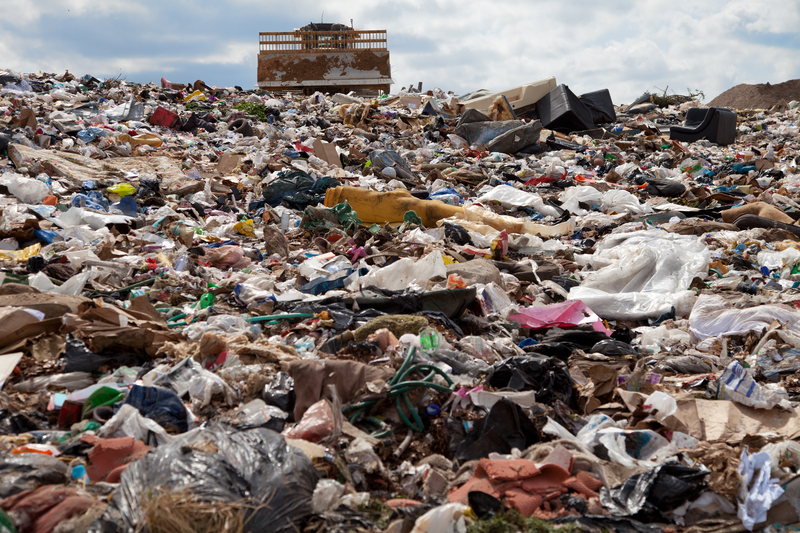Tackle Household Waste with These Simple Solutions
In today's eco-conscious society, dealing with household waste has become more important than ever. Our planet faces numerous environmental challenges, but with a few simple solutions, every household can significantly reduce household waste and make a big impact. If you're looking for actionable tips, inspiring ideas, and proven strategies, you've come to the right place. This comprehensive guide will help you tackle home waste in smart, effective ways--easily, sustainably, and affordably.

Why is Household Waste Management Important?
Every year, millions of tons of trash are piled up in landfills, threatening wildlife, our water supplies, and the overall environment. By focusing on household waste reduction, families can help conserve resources, lessen pollution, and save money. Effective waste management at home is not just an environmental responsibility, it's a step towards a healthier life for you and generations to come.
Key Environmental Benefits of Reducing Home Waste
- Decreases landfill space occupation
- Prevents harmful chemicals from leaking into soil and water
- Reduces greenhouse gas emissions
- Limits use of raw materials and saves energy
- Supports biodiversity and protects natural habitats
Now let's dive into simple and effective solutions to reduce, reuse, and recycle your household waste.
1. Adopt the Golden Rule: Reduce, Reuse, Recycle
Perhaps the best-known waste management strategy is the Reduce-Reuse-Recycle approach. Let's break down each part:
Reduce: Buy Smart, Waste Less
- Choose products with minimal packaging, or packaging that's recyclable.
- Purchase only what you need--make shopping lists to avoid overbuying!
- Opt for quality items designed to last rather than cheap disposables.
- Stop junk mail and switch to digital bills and statements.
Reuse: Make the Most of What You Own
- Repurpose glass jars or containers for storage.
- Turn old clothing into cleaning rags.
- Donate or sell items you no longer need, instead of tossing them.
- Bring reusable bags when shopping.
Recycle: Know What Goes Where
- Familiarize yourself with your local recycling policies--they can vary!
- Sort recyclables properly: paper, plastics, metals, and glass.
- Rinse containers to prevent contamination.
- Recycle electronics at designated collection points.
2. Composting: Nature's Way of Tackling Food Waste at Home
Did you know food scraps and yard debris make up more than 30% of what we throw away? Composting is a simple and effective strategy to handle kitchen waste and garden leftovers right at home. It helps you transform waste into valuable fertilizer for your garden while dramatically reducing the amount sent to landfills.
Simple Steps to Start Composting
- Set up a compost bin or pile in your yard or, for apartment dwellers, try indoor compost bins.
- Add vegetable peels, coffee grounds, eggshells, and yard trimmings to your compost.
- Avoid adding meat, dairy, and oily foods (they attract pests and can smell).
- Turn your compost regularly to aerate it and speed up decomposition.
- After a few months, use your homemade compost to feed your plants and improve soil.
Composting not only helps manage household organic waste, but also creates a valuable resource for your garden, reducing your dependency on chemical fertilizers.
3. Minimize Plastic Waste with Reusable Alternatives
Plastic pollution is a critical global issue, and much of it starts in our homes. Every time you use a plastic bag, bottle, straw, or wrap, you contribute to the growing problem of plastics in landfills and oceans. Kick the habit with these easy solutions to cut household plastic waste:
Smart Swaps to Ditch Single-Use Plastics
- Buy reusable water bottles and refill them.
- Switch to cloth shopping bags or baskets.
- Use glass, stainless steel, or bamboo straws instead of plastic ones.
- Choose rechargeable batteries and electronics over disposables.
- Select whole foods or items sold in bulk to reduce packaging waste.
Even small changes in your daily habits can result in dramatic reductions in plastic waste over time. Encourage your family and friends to do the same!
4. Reconsider Your Purchasing Habits
How you shop has a significant impact on the waste your home produces. Mindful purchasing can drastically decrease unnecessary waste.
Eco-Friendly Shopping Habits
- Support local producers to reduce the carbon footprint of transportation and excess packaging.
- Opt for products made from recycled materials.
- Buy in bulk to avoid individually packaged items.
- Choose concentrates and refills for cleaning products, soaps, and detergents.
Every shopping trip is a chance to make a difference. The less you bring home, the less you'll have to throw out later!
5. Manage Hazardous Waste Carefully
Some types of household waste require special handling--such as batteries, electronics, paints, and chemicals. These can be toxic to humans and the environment if not disposed of correctly.
Responsible Disposal of Hazardous Materials
- Store hazardous items safely until you can take them to a certified recycling or disposal facility.
- Check for community hazardous waste collection events.
- Don't pour chemicals down the drain or toss them in the regular trash.
- Research manufacturer take-back programs for electronics and appliances.
Proper management of dangerous waste protects your family and keeps harmful toxins out of landfills and water systems.
6. Reduce Food Waste: Shop, Store, and Cook Wisely
According to studies, up to 40% of the food in the US is wasted. You can drastically reduce kitchen and food waste by planning ahead.
Tips to Cut Down on Food Waste at Home
- Plan weekly meals and make detailed shopping lists.
- Store fresh produce properly to keep it usable longer.
- Cook and freeze leftovers before they spoil.
- Get creative with recipes to use up ingredients you already have.
- Embrace "ugly" fruits and vegetables--they're perfectly edible and often cost less!
Reducing food waste saves money, maximizes your grocery budget, and significantly cuts your household's environmental footprint.
7. Organize a Waste-Free Home
Organization can go a long way in helping you minimize house waste. When your spaces are tidy, it's easier to track what you have, avoid duplicates, and keep a handle on what goes out.
Declutter and Reorganize Effectively
- Regularly sort through food, clothes, and household items.
- Donate, recycle, or upcycle things you don't need.
- Set up a "reuse station" for items like bags, paper, boxes, and containers that can be repurposed.
- Label containers and shelves to know what's in your pantry and freezer at a glance.
With regular organization, you'll find yourself buying less and wasting less--saving time, money, and resources.
8. Get the Whole Family Involved
The most effective way to address home waste is to make it a team effort. Engage your family members with these fun and educational ideas:
- Host a household competition for who creates the least waste.
- Create colorful recycling bins and clearly label them.
- Involve kids in composting and explain the benefits.
- Assign roles: one person tracks food waste, another manages recyclables, etc.
When everyone is invested, reducing household waste becomes part of your shared routine--and can even be fun!
9. Embrace Eco-Friendly Cleaning Routines
Traditional cleaning methods often involve single-use products and chemical cleaners. Switching to greener cleaning solutions helps manage waste and is safer for your home.
Zero-Waste Cleaning Hacks
- Use cloth rags and mop heads instead of disposables.
- Make your own cleaning products with vinegar, baking soda, and lemon.
- Refill spray bottles instead of buying new ones.
- Choose cleaning tools made of wood, metal, or silicone.
Simple swaps not only reduce home waste but also lower your exposure to toxic substances and save money in the long run.

10. Stay Current: Keep Educating Yourself and Neighbors
Waste management trends and local recycling regulations are always evolving. Stay informed with reliable sources and community programs.
Ways to Keep Learning About Household Waste Solutions
- Follow your local municipality website for updates on recycling rules and pickup dates.
- Attend workshops or webinars on sustainable living and waste reduction.
- Share helpful articles, tips, and successes with friends and neighbors.
Knowledge is power--the more you learn, the more effective you'll be at tackling household waste, at home and throughout your community.
Conclusion: Every Little Bit Counts
Making changes to reduce household waste doesn't have to be overwhelming. By adopting just a few of these simple solutions--from composting to conscious consumerism--your family can play an essential role in building a cleaner, greener world. Not only will you save money and resources, but you'll also enjoy a sense of accomplishment and teach valuable lessons in sustainability.
Are you ready to take action? Start with one tip today and watch how small efforts add up over time. Tackle your household waste and be a part of the solution!